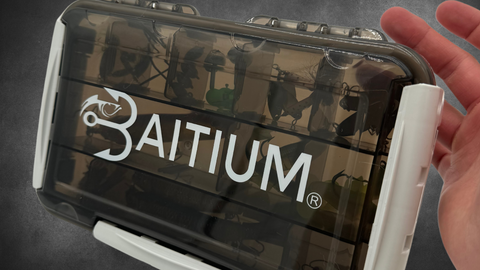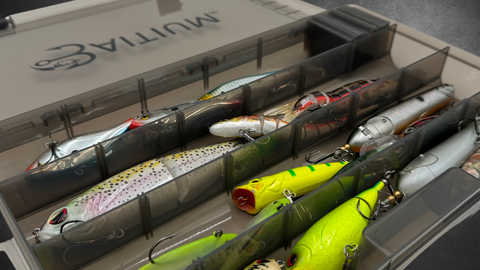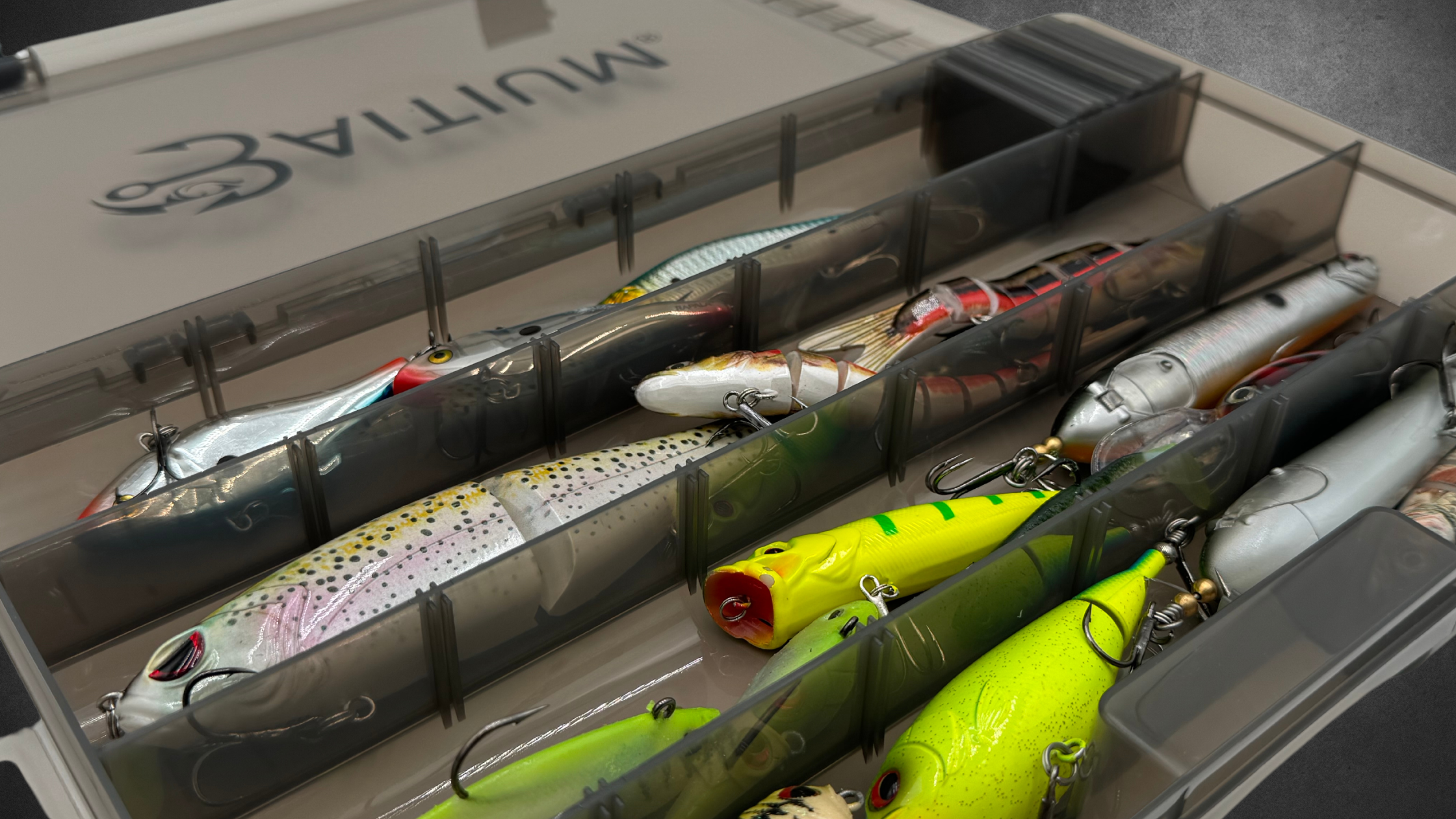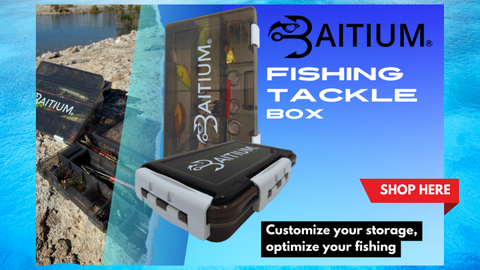Key takeaways
- Quick bait and technique changes are key to fishing success. An organized tackle box is essential.
- Properly storing gear saves time and protects your investments. Think long-term upgrades!
- Customize your tackle box by species and technique. This cuts down on clutter, boosting focus and catch rates.
Fishing success is all about your efficiency and adaptability. The anglers who can quickly change baits or lures and techniques to match the conditions catch the most fish. An organized tackle box is the foundation for your responsive approach.
First, it allows you to quickly adapt to promising strikes and shifts in location by providing immediate access to the right lure or bait needed for the conditions. This saves valuable time while you are fishing. Second, a thoughtful tackle system prevents damage to your expensive gear by neatly compartmentalizing and protecting each item. This preserves the value of your fishing investments for enhanced upgrades down the road. Finally, tailored utility boxes that categorize by species and technique simplify adjustments required to optimize your catches. By cutting clutter and distraction, you can focus entirely on prime fishing spots for a more productive, rewarding experience overall.
Table of Contents

A Step-by-Step Guide to Tackle Box Organization
Implementing an orderly tackle box system follows a simple flow:
-
Take Inventory
The first step is assessing the tackle you currently have. Take everything out of your box and break it down into categories:
- Saltwater vs freshwater
- Types of species targeted
- Hard baits vs soft plastics
This process gives you insight into how much of each type of gear you currently have, while also identifying problem areas that cause clutter and confusion when stored together.
-
Map Out a Layout
Next, map out a storage plan and desired layout for your tackle box. Think through ideal workflow - where you will access items most frequently and which gear needs protection.
Allocate specific compartments for different types of lures and baits. For instance, dedicate areas within the tray for hard baits like crankbaits and stickbaits, and another for soft plastics like worms and creature baits.
Store hooks, weights, swivels, and other terminal tackle in separate, smaller compartments. This ensures they are easily accessible and don't get mixed up.
Use the dividers to create custom-sized compartments based on the size and quantity of your gear. Larger items like big lures can have more spacious compartments, while smaller items like hooks and swivels can be stored in smaller sections.
Adjust or remove dividers as needed for larger items or to accommodate different types of fishing trips (e.g., saltwater vs. freshwater).
Don't forget to use the secure latch system to ensure your gear stays in place, even in rough conditions or when moving around.

-
Purge What You Don't Need
As you sort through inventory, be ruthless about purging lures and gear that you don't regularly use. Less volume makes organization easier. And clearing out old snarl-prone rubber worms and the like will prevent headaches later!
-
Contain Problematic Gear
Identity items most prone to tangling like rope lures and trailer hooks. Contain them in compartmentalized small containers to prevent issues when stored with other tackle and gear.
-
Implement Your Organizational Plan
With your layout mapped out and inventory purged/categorized, put your plan into action by storing gear in its designated areas. Be sure to neatly coil ropes, wires, rigs, etc. before packing them away. Arrange items in a way that maximizes the available space without overcrowding. This is particularly important if you're using the tray in small spaces like kayaks or smaller boats. Place frequently used items in the most accessible compartments for quick retrieval during fishing.
-
Label Everything
Use waterproof labels on the outside of containers/compartments as well as inside dividers. This ensures quick identification of exactly what’s inside to eliminate any lingering confusion while fishing.
Conclusion
The key to successful fishing lies in being adaptable and quick to seize opportunities when they arise. Having an organized tackle box is essential for you; it gives you quick access to the right bait at just the right time, especially when opportunities come unexpectedly. With a well-arranged storage system, you can save time, protect your gear, enjoy your experience more, and tailor your approach to the fishing environment. Being prepared gives you the freedom to act in the moment. A carefully organized tackle box frees you to fully immerse in your environment and make the most of every fishing opportunity.
For more insights on selecting and organizing fishing gear, check out our guide on What to Bring When Fishing. And find out the answer to the question we all wonder about: Is Today A Good Day To Go Fishing?
MOST READ NEWS:
How To Use Your Fishing Records to Catch More Fish
Track your fishing trips, analyze patterns, and refine your techniques with a fishing log to catch more fish on every outing!
Solo Fishing Safety Tips: Stay Safe and Enjoy the Outdoors
Learn essential solo fishing safety tips: gear checklist, boat safety, emergency preparedness, weather monitoring & fishing location scouting. Stay safe on the water.
Secrets to Winter Fly Fishing Success
Master winter fly fishing with expert tips on trout behavior, essential gear, and proven techniques. Learn the secrets to catching more fish in cold weather.
How Cold Water Changes Fish Behavior: Insights for Anglers
Explore how cold water affects fish behavior and fishing techniques, enhancing your angling success and strategy.
Is Tech Making Fishing Too Easy? Exploring Forward-Facing Sonar (FFS)
Learn about forward facing sonar in fishing - what it is, how it works, rules for tournaments, ethics, and tips for finding fish with this game-changing technology.
Plan Your Best Fishing Trip Yet this 2025: A Complete Guide
Plan your fishing trip this off-season. Learn to choose destinations, prep gear, pick bait, and trust Baitium for expert tools and tips!
15 Fishing Resolutions for 2025: Set Yourself Up for Success
Discover 15 essential fishing resolutions for 2025: tackle organization, gear maintenance, angling techniques, conservation tips, tournament prep, and fishing safety guidelines.



